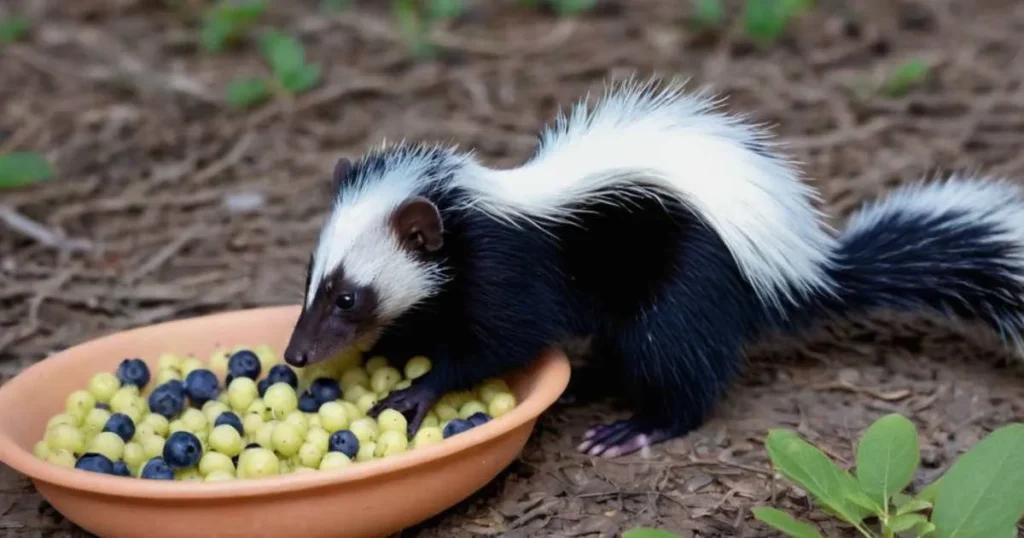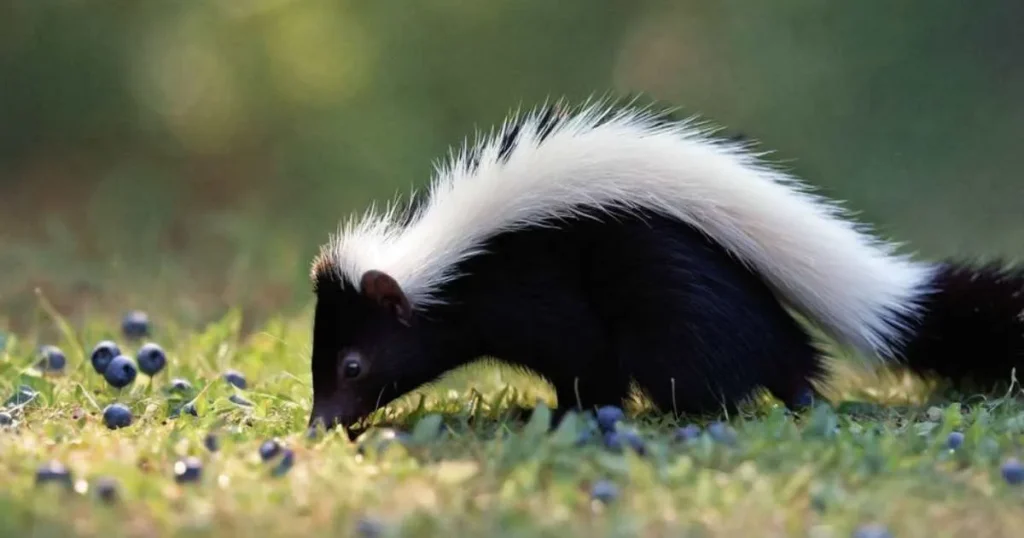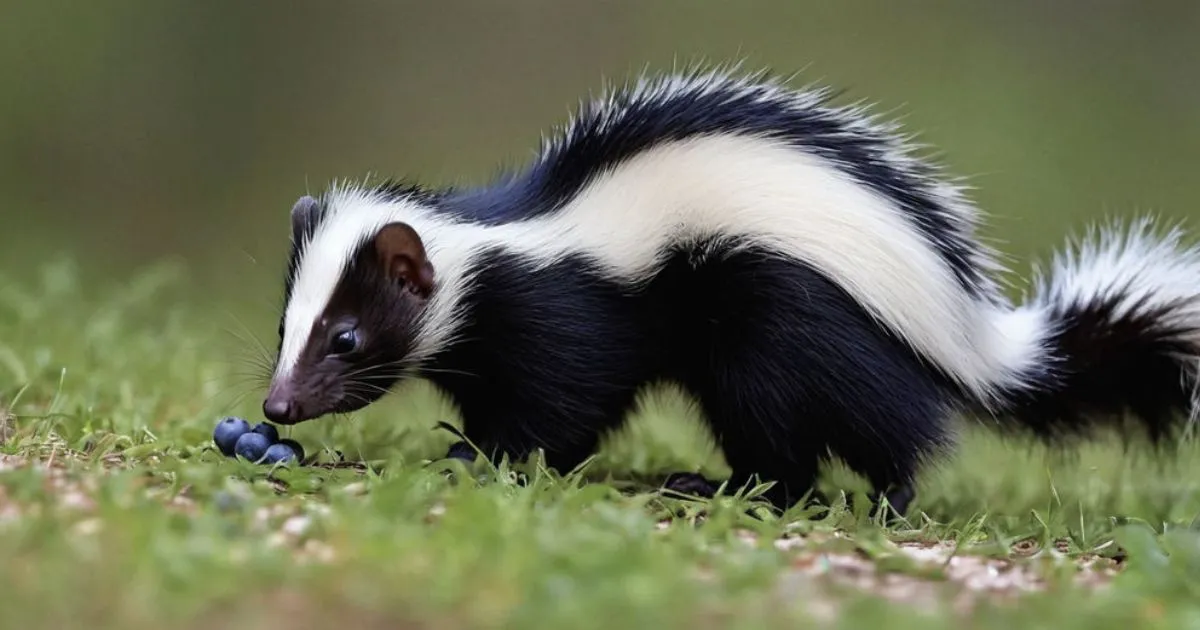Do Skunks Eat Blueberries? What to Know
Last updated on November 4th, 2024 at 06:53 am
As a skunk pet owner and wildlife enthusiast, I’ve learned some fascinating things about these black-and-white foragers. Did you know that skunks love blueberries? These creatures have a varied diet that includes fruits like blueberries, which provide them with important vitamins and energy. Skunks aren’t just about their famous spray; they’re also helpful by spreading seeds and keeping the ecosystem balanced. If you’re curious about what else skunks munch on and how they contribute to the environment, keep reading to get the full scoop!
Skunks: An Introduction
Did you know that skunks are more than just their smell? These creatures have a varied diet that might even include blueberries. Let’s dive into the world of skunks and learn more about their physical traits, where they live, and what they eat.
Physical Characteristics
Skunks are small to medium-sized animals known for their distinctive black and white coloring. They have a prominent stripe that runs from their head to their bushy tail. But their most famous feature is their spray, a strong-smelling liquid used for defense. Skunks have sharp claws for digging and a keen sense of smell to find food.
Environment And Habitat
Skunks make their homes across various environments. They know no borders, making homes in woods, grasslands, and even residential areas. Skunks adapt well to different places, seeking shelter in hollow logs, burrows, or under buildings. Their habitats provide them with access to a variety of foods, including insects, small rodents, and, yes, the occasional blueberry.
Here is a quick overview of their characteristics and habitats in a clear and easy-to-read table format:
| Feature | Description |
|---|---|
| Color | Mostly black with white stripes or spots |
| Size | Small to medium, with a fluffy tail |
| Defense Mechanism | Powerful, smelly spray from glands |
| They are not great climbers, but excellent diggers | Not great climbers, but excellent diggers |
| Habitats | Woods, grasslands, suburban areas |
| Nesting | Burrows, hollow logs, beneath structures |
Whether they’re foraging for berries or looking for a cozy burrow, skunks have unique attributes that make them fascinating animals to learn about.
Skunks’ Diet: What’s On The Menu?
Have you ever wondered what skunks munch on during their nocturnal adventures? These furry creatures have quite a varied palate, and yes, they do occasionally treat themselves to some juicy blueberries. Let’s take a closer look at a skunk’s diet and explore just what these little omnivores love to eat.

Omnivorous Nature
Skunks are not picky eaters. Their omnivorous diet means they’ll eat both plants and animals. They rely on a wide range of foods to get through their days (and more often, their nights). Whether it’s a fruit, a bug, or leftovers from a human’s meal, skunks will give it a taste.
Typical Food Sources
While many know skunks for their distinctive smell, their diet is a lot more diverse and includes:
- Insects: Beetles, grasshoppers, and other crawling critters.
- Small critters: Mice, voles, and eggs are on the menu too.
- Plants: Berries (like blueberries), nuts, and leaves.
- Human leftovers: Trash cans are like treasure troves to them.
Skunks adapt their diet to what’s available, so season and habitat dictate much of their menu. Foraging is a skunk’s game, and blueberries become a top choice when in season. Easy to find and packed with nutrition, these berries provide a tasty, energy-rich snack for our striped friends.
Blueberries In The Wild
Imagine walking through a forest and seeing a bush full of blueberries. In the wild, these berries are not just a treat for humans. Skunks love them too! Let’s explore how blueberries grow and if skunks can easily find them.
Growth Patterns Of Blueberries
Blueberries thrive in forest clearings. They need sunlight to grow. In the wild, they often form dense thickets. These thickets offer a plentiful bounty in the right seasons.
- Spring: Blueberry plants bloom with delicate flowers.
- Summer: Berries ripen, turning from green to deep blue.
- Fall: Bushes prepare for winter, shedding leaves.
Availability To Wildlife
Wildlife such as skunks find blueberries easily when in season. Blueberries can be less available at other times.
| Season | Availability |
|---|---|
| Spring | Limited, as berries are not ripe. |
| Summer | High, as berries are ripe and abundant. |
| Fall | Decreasing, plants prepare for winter. |
| Winter | Low, plants are dormant. |
Berry Consumption: Do Skunks Partake?
Wild creatures often surprise us with their diets. Skunks, known for their iconic smell, are no exception. These black and white mammals show a surprising taste for various foods. Let’s explore their sweet tooth for berries, specifically blueberries, a favorite among humans and animals alike.

Evidence Of Skunks Eating Berries
Observations in the wild have provided clues about the skunk’s diet. Evidence such as remnants near skunk habitats points to these nocturnal animals consuming a variety of berries. Wildlife enthusiasts often report seeing skunks foraging in areas where berries are abundant.
- Skunk droppings often contain berry seeds.
- Trail cameras capture skunks near berry bushes at night.
- Chewed berry remnants were found near skunk dens.
Attractiveness Of Blueberries
Blueberries, with their rich nutrients and sweet taste, attract various wildlife, including skunks. These berries are easy to eat and highly accessible for skunks during the summer months.
| Why Skunks Are Drawn to Blueberries |
| High sugar content |
| Soft, easily consumable skin |
| Abundance in certain regions |
In conclusion, skunks are omnivores that enjoy various foods. Blueberries stand out as a popular choice. This confirms that berry consumption is indeed a part of a skunk’s diet.
Nutritional Benefits Of Blueberries
The nutritional benefits of blueberries are impressive, making them a great snack not only for humans but for many animals, including skunks. These small berries pack a powerful punch in terms of health. Let’s delve into what makes blueberries a nutritious addition to the diet.
Essential Nutrients In Blueberries
Blueberries are a treasure trove of vitamins and minerals. They contain:
- Vitamin C: For immune support and skin health.
- Vitamin K: Essential for blood clotting and bone health.
- Manganese: Important for bone development and nutrient metabolism.
Furthermore, these berries are rich in antioxidants and fiber. Antioxidants help protect the body from damage. Fiber supports digestion.
Blueberries In Animal Diets
Many animals, including skunks, enjoy blueberries. These berries provide animals:
| Nutrient | Benefit |
|---|---|
| Fiber | Helps with digestion |
| Antioxidants | Protects cells from damage |
| Vitamins | Improves overall health |
Blueberries can be a part of a balanced diet for omnivorous animals like skunks, providing a range of nutrients to keep them healthy.
Skunks’ Foraging Behavior
Skunks are notorious for their defensive spray, but their diet is equally interesting. They’re omnivores and exhibit unique foraging behaviors. Skunks have a varied diet that they constantly adapt based on the seasonal availability of food. They use their excellent sense of smell to locate edibles. Their diet often includes fruits like blueberries, insects, small mammals, and more.
Search For Food Explained
Skunks possess a keen sense of smell which guides them to their meals. At night, they search for food using their noses. Skunks dig with their strong front claws to unearth bugs and grubs. When fruits like blueberries are in season, they won’t hesitate to enjoy them.
Seasonal Diet Variations
Seasons greatly influence what skunks eat. During warmer months, skunks love fresh fruits and berries. Blueberries, being abundant in summer, become a favorite treat. Insects and small mammals also make up a large part of their summer diet. As winter approaches, they might switch to available nuts, seeds, and leftovers from human activity.
| Season | Typical Skunk Diet |
|---|---|
| Spring | Insects, Worms |
| Summer | Fruits (Blueberries), Small Vertebrates |
| Fall | Nuts, Seeds, Eggs |
| Winter | Human Waste, Carcasses |
Human-skunk Conflicts Over Garden Foods
Picture a calm evening in your garden. Suddenly, a skunk appears. The skunk is not just visiting. It wants to feast on your berries.
Gardeners love blueberries. So do skunks. When skunks find blueberries, conflicts can happen. People do not want to share their berries with these furry visitors.
Skunks In Backyard Berry Gardens
Skunks are known for their digging habits. They invade gardens at night. Their eyesight is poor, but their smell is great. They use this sense to find your blueberries.
- Skunks like ripe, juicy blueberries.
- They will eat fallen fruit.
- Skunks often come back if they find food.
Protect your garden parties from these furry berry lovers.
Mitigating Skunk Incursions
Keep skunks away from your berry garden. Use these tips:
| Tactic | Description |
| Fencing | Install below-ground fences to stop skunks from digging. |
| Motion-activated lights/sprinklers | These scare skunks away. |
| Removing attractants | Keep fallen blueberries cleaned up. |
| Natural repellents | Use smells and substances skunks dislike. |
By following these steps, your blueberries can be just for you. Enjoy the fruits of your labor without skunk surprises!
Conservation Aspect: Berries As Skunk Sustenance
Conservation Aspect: Berries as Skunk Sustenance.
Imagine a world where skunks thrive, not just survive. Berries play a vital role in this. Skunks are omnivores, meaning they eat both plants and animals. Among their favorite treats are juicy, ripe blueberries. These berries aren’t just delicious; they’re crucial for skunk survival. This isn’t only about their diet; it’s about their very existence. Let’s delve into how blueberries impact skunks and ways to promote berry growth for our wildlife friends.
Impact On Skunk Populations
Blueberries provide essential nutrients that help skunks stay healthy. These nutrients contribute to their reproductive success, influencing population stability. A steady diet of blueberries can result in:
- Improved overall health – Vitamins found in blueberries boost skunk immunity.
- Better growth rates – Juveniles benefit from antioxidants and vitamins.
- Enhanced reproduction – Healthy adults are more likely to produce healthy offspring.
Thus, abundant berry supplies can significantly enhance the skunk population’s health.
Promoting Berry Growth For Wildlife
Supporting wildlife goes beyond leaving out water bowls. It involves ensuring they have access to natural food sources. By promoting berry growth, we help not just skunks but an entire ecosystem. Here’s how to encourage berry proliferation:
- Plant native berry bushes – This supports the natural diet of local skunks.
- Use organic gardening practices – To avoid harming wildlife with chemicals.
- Protect natural habitats – Conservation efforts keep berry supplies steady.
Engaging in these activities, we ensure that skunks and other wildlife have a constant berry feast.
Further Studies On Skunk Dietary Habits
Curiosity about the dietary preferences of skunks has spurred new studies. Skunks, with their distinctive black and white coats, often wander into suburban areas. Do these creatures enjoy a feast of blueberries? Researchers and wildlife enthusiasts have observed their eating habits closely to find out.
Scientific Research Findings
Scientists have taken to the lab and field to understand the skunk diet. Here are their key findings presented concisely:
- Varied Omnivorous Diet: Skunks don’t strictly eat fruit.
- Seasonal Eating Patterns: Fruit intake, including blueberries, increases in summer.
- Nutritional Needs: Skunks seek foods like blueberries for their nutrients.
| Food Type | Percentage in Diet | Season |
|---|---|---|
| Fruits like Blueberries | 15% | Summer |
| Insects | 70% | Spring/Summer |
| Small Rodents | 10% | Year-Round |
| Other | 5% | Varies |
Observations By Wildlife Enthusiasts
Outside of controlled studies, observations in natural settings occur. Wildlife enthusiasts share these insights:
- Skunks forage for blueberries near human residences.
- Evening sightings show skunks consuming fallen blueberries.
- Cautious of humans, they retreat quickly after eating.
Images and videos captured by enthusiasts offer visual proof. These personal studies support scientific findings, confirming skunks’ fondness for blueberries.
Frequently Asked Questions
Skunks can safely eat a variety of fruits including berries, bananas, apples, and pears. They often enjoy melons and grapes as well.
Skunks primarily feast on insects, grubs, and worms. They also enjoy small rodents, fruits, nuts, and plants. Their diet changes with seasonal availability.
Yes, skunks enjoy eating berries. They often incorporate various berries into their omnivorous diet for nutrition and variety.
Conclusion
Exploring skunks’ diets has been insightful, revealing their fondness for blueberries. They enjoy these nutritious berries just as much as we do. As natural foragers, skunks provide an example of the diverse eating habits within the animal kingdom. Remember, a balanced ecosystem thrives on such variety.

